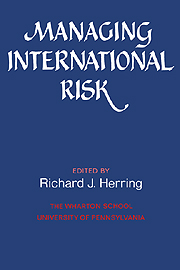 Managing International Risk
Managing International Risk Published online by Cambridge University Press: 07 May 2010
These remarks constitute a “perspective” and are not meant as a critique of Professor Richard Cooper's chapter. My perspective is that of the student of international politics, the true “dismal science,” since the repeal of the Iron Law of Wages and the development of new technologies of destruction and oppression that strengthen the hands of repressive governments – and terrorists – around the world.
This may be a dismal way to begin my commentary. But putting matters this way suggests an initial perspective on Professor Cooper's chapter. The risks with which Professor Cooper is concerned all have their origins in actions that would directly affect economic transactions of specific types – foreign exchange dealings, debt repayments, and trade in manufactured goods and in oil. Political-military risks, most notably, the risk of nuclear war and of a continually accelerating arms race, are not considered. Yet in the past, the world economy has been disrupted by war as well as depression, as the experience of World War I suggests. And in the present state of Soviet–American relations, the risks of nuclear war and of an escalating arms race should not be underestimated. The chief military advisor to the National Security Council declared in October 1981 that the Soviet Union had achieved military superiority, was “on the move,” and was “going to strike” (New York Times, Oct. 21, 1981). Earlier that same month, the president of the United States suggested that a tactical nuclear war was possible in Europe without, perhaps, leading to a nuclear exchange between the superpowers.
To save this book to your Kindle, first ensure [email protected] is added to your Approved Personal Document E-mail List under your Personal Document Settings on the Manage Your Content and Devices page of your Amazon account. Then enter the ‘name’ part of your Kindle email address below. Find out more about saving to your Kindle.
Note you can select to save to either the @free.kindle.com or @kindle.com variations. ‘@free.kindle.com’ emails are free but can only be saved to your device when it is connected to wi-fi. ‘@kindle.com’ emails can be delivered even when you are not connected to wi-fi, but note that service fees apply.
Find out more about the Kindle Personal Document Service.
To save content items to your account, please confirm that you agree to abide by our usage policies. If this is the first time you use this feature, you will be asked to authorise Cambridge Core to connect with your account. Find out more about saving content to Dropbox.
To save content items to your account, please confirm that you agree to abide by our usage policies. If this is the first time you use this feature, you will be asked to authorise Cambridge Core to connect with your account. Find out more about saving content to Google Drive.